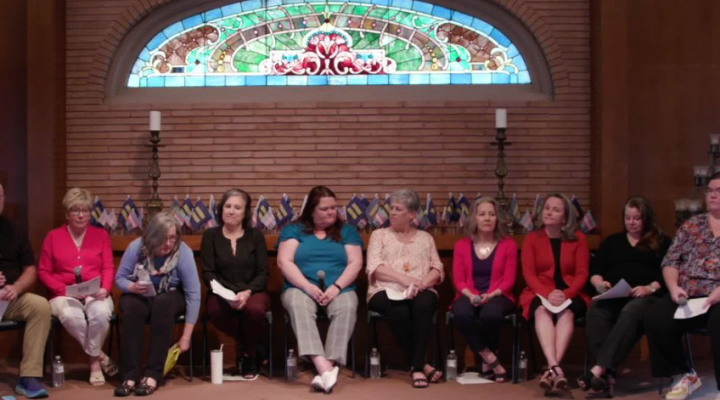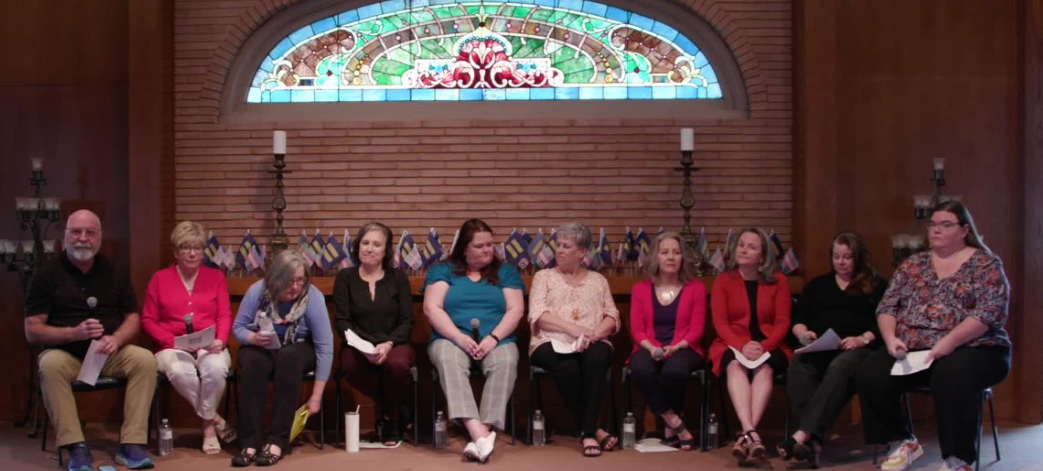Loving and supporting LGBTQ children does not make Christian parents bad Christians, Mama Bears founder Liz Dyer said during a roundtable presented by the Human Rights Campaign.
“I like to emphasize that my faith led me to become affirming of my son, to become supportive of my son and of all LGBTQ people,” Dyer said during the nine-person discussion taped at Wilshire Baptist Church in Dallas, and moderated by Mark Wingfield, executive director and publisher of Baptist News Global.
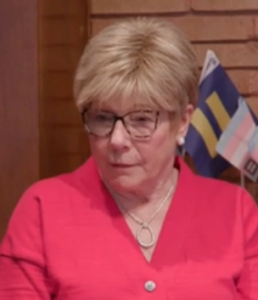
Liz Dyer
“I want parents — the Christian parents of LGBTQ kids — to know you don’t have to choose between your faith and your child. There’s no conflict,” said Dyer, whose organization seeks to educate, empower and support families with lesbian, gay, bisexual, transgender and queer members.
The dialogue was held against the backdrop of approximately 500 anti-LGBTQ bills being considered in statehouses across the nation. In Texas, which accounts for 20% of those measures, bills are being considered to restrict health care available to transgender children, what athletic teams transgender students can join and how gender and sexuality can be taught in schools.
“We want to hear tonight from some Mama Bears — folks who are living this story in their own families and who know what it is about,” Wingfield explained. “These are all mothers of children who identify somewhere within the LGBTQ community,”
The conversation ranged from how anti-trans legislation in Texas has affected families, about their faith lives and what they want Texas residents and legislators to know about the suffering of their children in the current political and religious climate.
“These bills not only are discriminatory and mean, they are also cruel, and they are red meat to certain voters,” Wingfield said. “This is not really about people; it’s about appealing to a certain voting mindset to get reelected.”
With hostility against the LGBTQ community on the rise nationally, it’s important to connect with those who have firsthand knowledge of the damage caused by homophobic rhetoric, he said. “When we stop talking and listen to people who are living an experience, it makes a profound difference. We learn more, we know more. We can be better educated about what’s going on.”
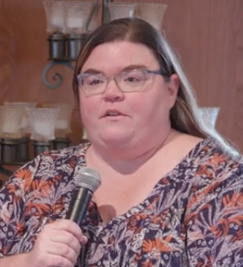
Tiffany
Participants introduced themselves by first names only and began by discussing how current legislation in Texas has affected their families. For Frisco resident Tiffany, an engineer, and her teacher husband, it has created a painful dilemma involving their teenage son and adolescent transgender daughter.
“Our 14-year-old son is going through a medical emergency. He’s been hospitalized three time since January, so he has an extensive network of physicians and support and therapists here in the state of Texas,” she explained. “But with the threat of these anti-trans laws and the health care bill, we are now having to look at where do we go, what happens next, and how are we going to take care of not only our 14-year-old son, but our 12-year-old trans daughter as well?”
The choices before the family involve potentially fatal consequences for either child if they pivot to meet the needs of just one child, she said.
“I feel like they’re asking me to decide which child is more important.”
“I feel like they’re asking me to decide which child is more important. If I stay and my child has to detransition, I could lose her. I almost nearly lost her before she came out. I can’t go through that again. If we move, I may lose my son. I am now every night asking my husband: Is it time for us to separate and one of us take our daughter to a state where she’s safe, and the other one stays here and hope that our son survives?”
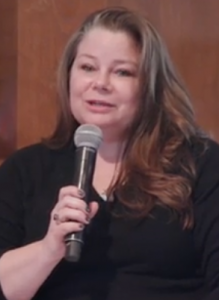
Diana
The anti-LGBTQ mood in the Texas statehouse has led some relatives to shun Diana and her husband for nurturing their 16-year-old transgender son and 14-year-old nonbinary child, both of whom are receiving gender-affirming care.
“We have accepted that this state is not safe,” she said. “It is not safe for my family, it’s not safe for my children. Even when you’re not in Austin, when we hear what’s being said about our amazing children — this is an unfriendly warlike place.”
The situation is heartbreaking because the family has a strong Unitarian church home where the children have participated in Christmas plays and one of them has served as a youth group worship leader, she added. “We are heartbroken, but we have made the decision that my youngest and I will leave Texas this summer and we will move to a sanctuary state that protects us. … And this is all because of this hateful rhetoric that is coming from the far right that we’re now seeing in this legislative session.”
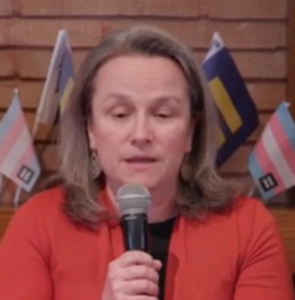
Gretchen
Concern that the anti-LGBTQ atmosphere in Texas could emerge in other states led Gretchen’s 20-year-old gay son to pursue a fashion design degree in New York instead of the Georgia college where he also was accepted.
“He said, ‘I can’t move to Georgia. It would be like staying in Texas,’” Gretchen recounted. “The reason he feels that way is because we live in Keller, Texas, and we ban books there and we cannot have books on our shelves that mention a nonbinary or trans character at all. We would have pulled him (out of school) if he wasn’t a senior. My babies will never come back to the state where they were raised until something changes.”
“My babies will never come back to the state where they were raised until something changes.”
Wingfield asked panelists how their experiences have been influenced by religious belief and if they consider their faith to be different from those advancing anti-gay and anti-trans legislation.
Carla said the Catholic Church she married into is doing a poor job of living up to the Latin definition of its name — “universal.”
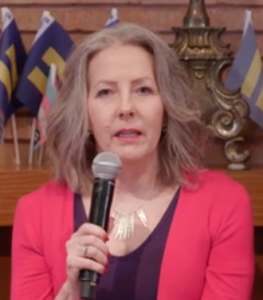
Carla
“We don’t feel safe there, nor do our children, and none of us attend mass anymore,” said Carla, who has a gay son and two daughters who identify as pansexual. “As a result, I still feel very spiritual. I still pray. It’s just in a different way. I feel people who are pushing these religious agendas, banning books and excluding people, are not being inclusive, are not being loving and are not accepting all of God’s children.”
Nor is the Lutheran Church-Missouri Synod living up to its stated beliefs about how to treat others, said Debbie, a Garland resident with an adult son who is gay.
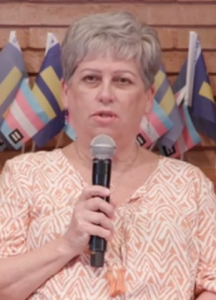
Debbie
“They teach that everyone is created in God’s image. They also teach that the greatest commandment is to love one another. However, that’s not the case,” she asserted. “My son was told when he came out that he would not be able to be a Sunday school teacher. He could not be a youth group leader. Those are his passions. So, I still have my belief in God. I still pray. I still worship wherever I can go, it’s just not in a church.”
“I still have my belief in God. I still pray. I still worship wherever I can go, it’s just not in a church.”
Dyer said her Southern Baptist background imbued her with a penchant for scrutinizing theologies, which in turn led her to re-examine her own faith after her son came out as gay.
“It became overwhelmingly evident to me that non-affirming theology was not producing good fruit in the life of people that were wholeheartedly embracing it. It was producing things like depression, self-loathing, isolation, self-harm.”
But through her son she encountered heterosexual, gay, lesbian and transexual Christians who had healthily integrated acceptance and faith, she said.
“I was meeting LGBTQ people who were embracing affirming theology wholeheartedly. And yes, there are Christians who affirm LGBTQ people, contrary to what a lot of Christians in Texas might tell you. And those Christians who are embracing affirming theology were more whole and healthy in every way — relationally, emotionally, mentally, spiritually, even physically.”
Wingfield added that First John 3:17 questions whether God is present in those who do not help others in need.
“We are in a situation right now in Texas and other states across the nation where our brothers and sisters are in need,” he said. “They are in the ditch, they are hurting, they are under threat. And if the love of God abides in us and we have the resources of privilege and access to things they do not, and do not use those for this cause, how can the love of God be in us?”
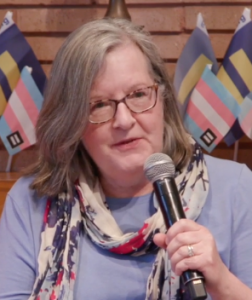
Mary Ann
Mary Ann, who has a nonbinary son, agreed: “The main commandment God and Jesus gave us is to love God and love your neighbor as yourself. If you love God and you’re a Christian, how can you be comfortable with how the state is treating people in Texas or anywhere in the country? How can you sit back and feel so complacent in your comfort, your privilege?”
Participants also were asked what message they have for other people of faith on the challenges facing LGBTQ people and their families.
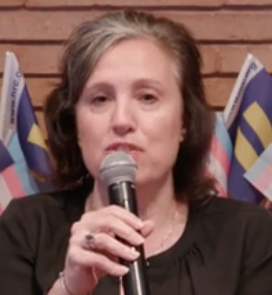
Amanda
Grapevine resident Amanda said her family’s membership in a conservative church began to unravel when her youngest child came out as nonbinary in 2016.
“It took us several years to leave that church, and it was a very painful process. We probably should have left earlier for our own spiritual health, but also especially for the sake of our youngest who was hurt by that church and who now has completely rejected church and faith,” she said.
It has taken a lot of adjustment for both parents and their older son, as well, she added. “Over the past few years, my husband and son and I have been going through a process of spiritual deconstruction. It’s been hard, but it’s brought us to a healthier, more peaceful, more integrated faith perspective. And now we go to an inclusive, affirming church in the area which we love very much.”
Families feeling isolated from churches can find community through podcasts, webinars and workshops organized by likeminded groups, Amanda said. “God loves all of us no matter where we are in our spiritual journey. If you’re in a place where you don’t feel like you can be part of a church, or even read the Bible or pray, then that’s OK. And really just give yourself love and grace in that process. Just don’t give up and keep looking for the right faith community for you.”
Panelists also had messages for Texas legislators. Tiffany said hers would be that the least interesting fact about her daughter is her transgender identity.
“These bills make her out to be some monster.”
“Honestly, she is just a ray of light. She’s amazing. She plays the bassoon in middle school. She has a cat that follows around everywhere she goes. She raids her dad’s closet for all of his flannels and her brother’s hoodies. She’s just like any other child. And these bills make her out to be some monster, that she’s out there planning on harming other kids or trying to indoctrinate them. She was created in God’s image, and she deserves to be loved and to be cherished just like your child.”
Diana said she would communicate her outrage to Texas legislators: “I am incredibly angry that bigotry is now the language of our state. I have been in the state since 1998. I made a home. I’ve employed Texans. I made Texans. And I am being forced to leave because I will not subject my family to bigotry anymore.”
Carla urged lawmakers to consider loving and accepting LGBTQ children even if they can’t understand them. “You can still protect our children because a lot of what these transgender families are dealing with is potentially losing their child. The suicide rate in the transgender community is just astronomically high if they’re not receiving gender-affirming care and if they’re not being accepted by their families. And when they have society not accepting them as well, it’s just awful.”
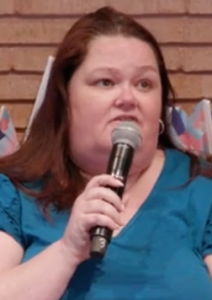
Dawn
Texas lawmakers should remember the power of homophobic words aimed at LGBTQ children and when supporting legislation damaging transgender youth and their families, said Dawn.
“A lot of very hurtful words are being thrown around. Words like ‘grooming’ and ‘predators’ are words that are really important when they’re used in the right context, but they’ve been weaponized. It’s really important that we don’t turn those words against people who aren’t hurting anyone,” she said.
Wingfield urged audience members to consider the human impact of such legislation.
“Sometimes we might say, ‘I don’t know anyone that this affects.’ Now you do because you’ve just heard from nine mamas tonight who’ve told you their stories about how this has a practical effect on their families.”
Related articles:
Texas officials’ new attack on transgender care called a ‘political ploy’ at the expense of children
Please pay attention to the plight of transgender children and their families | Opinion by Mark Wingfield
My home state is no longer safe for my family | Opinion by Lucas Land

